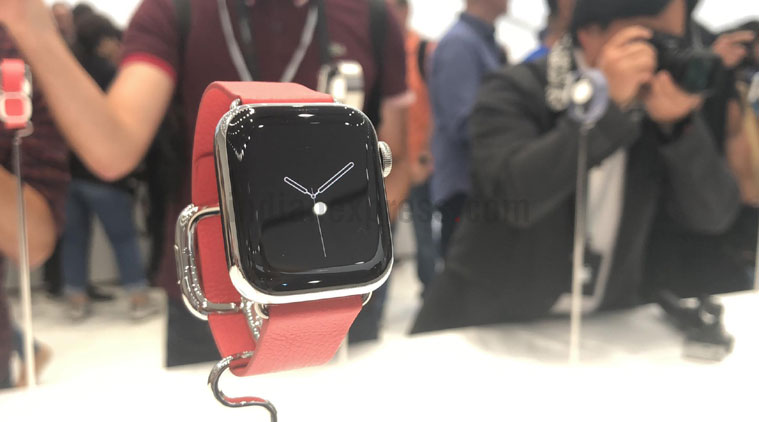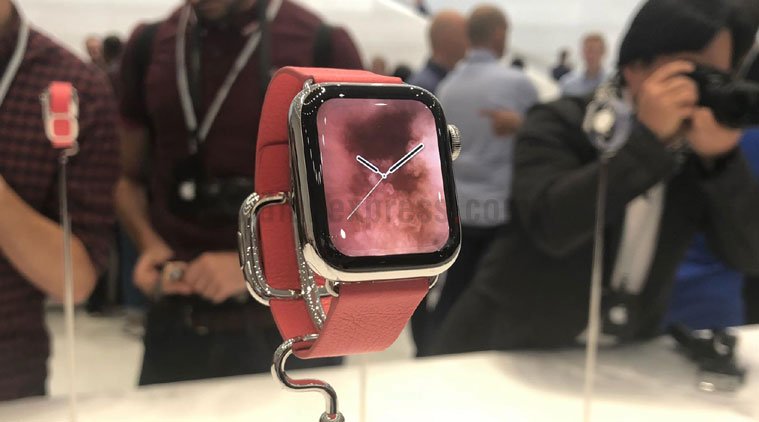 Apple Watch Series 4 has ECG function and it comes with FDA clearance. But what does it mean? We explain below.
Apple Watch Series 4 has ECG function and it comes with FDA clearance. But what does it mean? We explain below.
Apple Watch Series 4 comes with some interesting features when it comes to tracking a user’s health, especially where the heart is concerned. Apple has added an ECG function to the Watch’s Digital Crown, making this the first over-the-counter ECG device. ECG or Electrocardiography records the electrical activity of the heart in order to detect if there are some heart-related issues.
The company adds that the Watch is “capable of generating an ECG similar to a single-lead electrocardiogram,” and this is done by simply placing the finger on the digital crown of the device. Another feature of the new Apple Watch is that the heart-rate sensor can detect unusually low or high heart-rates or irregular heart rhythms (arrhythmias) and warn users.
The watch also comes with clearance from the US Food and Drug Administration (FDA), which is the federal agency in the United States that approves drugs, medical-related devices, newer treatments.
Apple Watch Series 4 has FDA clearance: What does it really mean?
First keep in mind that these are FDA clearances, and not FDA approval as such. The two are not the same thing. Apple Watch gets a clearance because under the agency’s rules, the product is in Class II. The Verge points out that Class II and I products only get FDA clearance, not approval as these are considered lower-risk products. An FDA-approved device would have gone through much more testing to get that stamp. Still, Apple’s ECG on a watch feature is unique, because this is the first “direct-to-consumer” wearable with this kind of ability.
Additionally, FDA says that the irregular heart rhythm and ECG feature should be limited to use by people who are 22 years or older. Anyone younger should not be using these features, according to the agency.
On the ECG feature, the FDA clearance letter notes,“The ECG app is intended for over-the-counter (OTC) use. The ECG data displayed by the ECG app is intended for informational use only.” Further it is not “recommended for users with other known arrhythmias.”
So, if you have a heart-related problem and thought the Apple Watch Series 4 might sound like a good way to keep a track of this, FDA is not recommending its use. Only people who are otherwise healthy, and have no known heart conditions should ideally use these new heart-related features.
Most importantly a “user is not intended to interpret or take clinical action based on the device output without consultation of a qualified healthcare professional.” What this means it that even if the Apple Watch does flash cause for alarm, unless a doctor confirms the same after running comprehensive tests, users should not assume the worst.
FDA’s clearance notes that this is not meant in anyway meant to replace traditional methods of diagnosis. The final word will still belong to a doctor, after actual medical tests have been done. At best, the Apple Watch might warn of an issue, but without a doctor’s confirmation it is not to be taken as medical diagnosis.
 Apple Watch Series 4 has FDA clearance for the two features.
Apple Watch Series 4 has FDA clearance for the two features.
On the irregular heart rhythm feature, the FDA notes, “It is not intended to provide a notification on every episode of irregular rhythm suggestive of AFib and the absence of a notification is not intended to indicate no disease process is present; rather the feature is intended to opportunistically surface a notification of possible AFib when sufficient data are available for analysis.” So the Watch can supplement the decision for screening for irregular heart rhythms, but it cannot replace traditional methods of diagnosis.
It is best to keep in mind that with ECG and irregular heart rhythms feature, Apple Watch 4 while unique comes with a list of caveats. It is cannot replace diagnosis by a doctor, and should ideally be seen as additional data that can help users and their doctors.